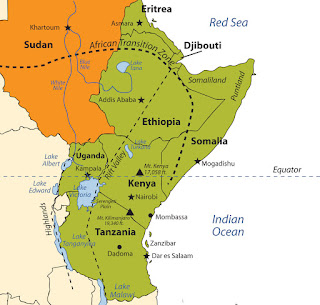Introductions; East African politics
Introductions to this blog series on East African water politics:
My name is Mary Habtes and over the course of several weeks,
I will explore the dynamics of water politics, riparian rights, development in
conjunction with the growing political unsettlement within the region. I have
chosen to focus on East African political issues relating to water for various
reasons; firstly I have a emotional tie to the region coming from an East African
background, I have seen and heard first hand the numerous economic, social and
political issues that have resulted from poor governance, climate issues and stagnant
economies and in many occasions water is the common denominator. In addition to
this, East Africa has been a key region for water scarcity and heavily publicised
since the late 90s due to the level of extreme poverty faced in the region.
Much of this has been attributed to inadequate rainfall, extreme climate variabilities
exacerbated by climate change, a lack of funding and investment into industries
and technologies that alleviate these issues (World Bank, 2019). And what of
politics? It would be premature to assume that these issues co-exist without some
key sources and one, I believe, is politics in the form of governance, diplomacy
and international riparian law. Much of these aforementioned issues are inextricably
linked to politics which I am to explore in greater depth over the coming weeks.
It is at a key time that I have chosen to explore East African water politics, with
an impending war, a raging global pandemic and locust infestations depleting crops,
the projections for international relations are tense and the effect on the people
may be lethal.
Figure 1: Map of East Africa
East Africa is home to approximately 4450 million people
based on the latest United Nation estimates, accounting for 5.7% of the
population and an average growth rate of 6.7% between 2013-2017, making it one
of the fastest growing regions in the continent (Worldometer, 2020; Tralac, 2018).
With a steady growing population and rapid social and urban developments, water
issues are inevitable. Some of the key water issues pertaining to rapid urban expansion
particularly in Kenya and Tanzania has been the ability to accommodate the
expansion of high-quality water supplies for all in an urban setting as well as
a host of political public-private water management disputes (K’Akumu, 2004).
However, upstream the geopolitical issues pertain to the securitization of
water resources of the Nile Basin, notably the feud between Ethiopia and Egypt,
dubbed ‘water war’ in which the Nile resources are often used as a political
weapon (Cascao et al. 2019). This not only threatens economic development but
more imperatively the peace within the region (Deconinck, 2009). The impacts of urbanisation on a nation’s internal
political dynamics and the political turmoil that has resulted from disagreements
over the management of water resources are without doubt across a wide array of
literature. However, throughout this blog, I will also explore the nexus between
climate change, water resources and politics as another subtheme of ‘water and politics’.
This theme has not yet been explored widely and there is certainly isn’t any consensus
in academic literature of climate-driven political conflict (The conversation),
despite this, I aim to also explore how the shift in East African climate can result
in water related political issues backed by theory and the tumultuous historical
riparian disputes.
References:
Cascão, A., Rawia, T. and Zeitoun, M., 2019. Routledge
handbook on Middle East security: Routledge.
CENTRE, T., 2018. East Africa The Fastest Growing
Region In Africa, With People Leading Longer And Healthier Lives. tralac.
Available at: https://www.tralac.org/news/article/13721-east-africa-the-fastest-growing-region-in-africa-with-people-leading-longer-and-healthier-lives
Deconinck, S., 2009. Security As A Threat To
Development: The Geopolitics Of Water Scarcity In The Nile River Basin. Focus
Paper. Available at: https://www.waternet.be/documents/Security_as_a_threat_to_development_Deconinck.pdf
Kakumu, O., 2004. Privatization of the urban water supply in
Kenya: policy options for the poor. Environment and Urbanization,
16(2), pp.213-222.
The Conversation. 2020. Politics And Poverty Caused
Past Conflicts In East Africa -- Not Climate Change. Available at: https://theconversation.com/politics-and-poverty-caused-past-conflicts-in-east-africa-not-climate-change-96372.
World Bank. 2019. Accelerating Poverty Reduction In
Africa: In Five Charts. Available
at: https://www.worldbank.org/en/region/afr/publication/accelerating-poverty-reduction-in-africa-in-five-charts.
Worldometers.info. 2020. Population Of Eastern
Africa (2020) - Worldometer. Available at: <https://www.worldometers.info/world-population/eastern-africa-population/.

Very interesting first post! I really like how you have woven in some of your personal reflections. I think your post can be enhanced by separating out the main reasons you have chosen to focus on your topic and describe each in their own paragraph. You can then provide the geographic context (as you have already done here).
ReplyDeleteAdd a line or two at the end to conclude - reflect on the main reasons for your blog and the context you have covered.
Please see the blogging FAQs (Task 1.1.) on Moodle to see how to reference the resources you use.
Please post more regularly so that we can hear more about your interesting topic!
ReplyDeleteGreat introduction! I am looking forward to reading about all the topics mentioned above
ReplyDeletegreat introduction. i like how you have used your own personal insight as well.
ReplyDeletearea to improve:
- referencing using hyperlinks
- splitting the paragraphs and points so it is easier to read and flows better